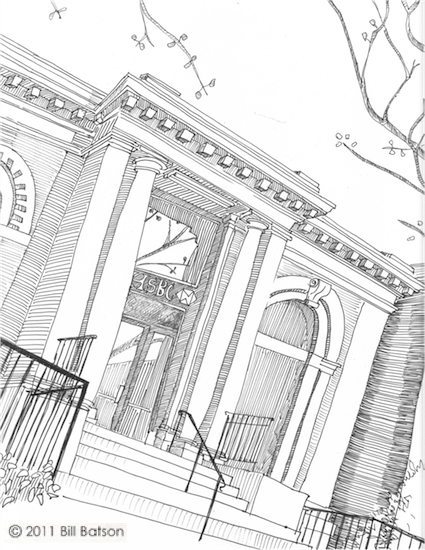 by Bill Batson
by Bill Batson
I was one day away from visiting the Occupy Wall Street encampment at Zucotti Park. I was visiting a friend near Central Park on Monday November 14 and intended to make OWS my next stop. I wanted to see it all for myself without the filter of cable news: the occupiers, the library, the free clinic and the police presence, too. However, I was turned around by responsibilities on the home front and a few hours later, in the pre-dawn darkness of Nov 15, it was suddenly gone. Now I will have to clutch my copy of the Occupy Wall Street Times that a fellow-traveler brought me like a historic relic.
What will now happen to this movement that spread across the globe now that Zucotti has been emptied? The ground swell that rose to meet the twin evils of financial sector fraud and extravagance can’t be easily dismissed. But how will our relationship with Wall Street affect Main Street and the nearest available symbol of global finance, our local banks?
The bank in this sketch was selected for purely illustrative and aesthetic purposes. I chose the building for its classical façade, not to point an accusatory finger at its current tenant. Actually, there is evidence that this branch is a good actor. HSBC has been a major supporter of Rivertown Films and makes generous accommodations to its patrons, by, for example, being dog friendly.
My aunt had her bank account in this building when it was a Marine Midland bank. I only entered once, but the beauty of the interior was etched into my memory. There is something about this bank that harkens back to a time when tellers and managers knew their depositors and supported important local programs. The Nyack branch, as well as other HSBC branches in New York outside of NYC, has been sold to First Niagara Bank of Buffalo. We can only hope that new owner will continue to be as good a neighbor as HSBC has been.
But across America, other depositors have demonstrated their displeasure with the local branch of the big banks. The Bank Transfer Day movement inspired nearly one million depositors to move their money. Even though Bank Transfer Day founder Kristen Christian claims no affiliation with OWS, I doubt the campaign would have succeeded without the anti-bank zeitgeist unleashed by Occupy Wall Street.
About 650,000 customers moved $2.5 billion from big banks to community banks after Bank of America announced a $5 per month surcharge for debit card users. On one day ‘€“ November 5 ‘€“ 40,000 people moved $80 million into credit unions.
This was a sea change in consumer behavior. When nearly one million depositors simultaneously moved their money, it gets banker’s attention: Bank of America and their competitors subsequently decided to drop the debit card fee.
Occupy Wall Street has had several clear victories. Political discourse has turned from ‘€œwhat we can do for the economy’€ to ‘€œwhat the economy can do for us.’€ Because the conversation was both national and local, people in communities across America were able to engage in local, national and global politics.
This tactic is reminiscent of the protests staged during the Southern Civil Rights Movement. The act of violating desegregation ordinances in the 1960’s gave Americans a way to commit civil disobediences through a simple public act. In the same way that every southern town had a water fountain or a bus depot to desegregate, every American city, town or village has a park to occupy. Pitching a tent today has become a radical act in the way that sipping from a water fountain or sitting in a bus seat was in the South in the 60’s.
Some of the police response to OWS has been excessive and also reminiscent of the civil rights struggle with yesterday’s fire hoses being replaced with pepper spray today. Videotaped images from New York City, Seattle and UC Davis showing police officers spraying peaceful protestors in the face have shocked the conscience of the nation.
There is also the question of selective enforcement. Nearly one thousand protestors were arrested on October 17, the two month anniversary of the OWS. How many people have been arrested for the fraudulent trading that caused our economic collapse? What action is a bigger threat to our country, the perceived nuisance of camping in a public park or systematic financial fraud?
When I think about night the NYPD raided OWS, I am reminded of the conclusion of a similar encampment that occurred in Washington DC in April 1968. Dr. Martin Luther King’s last demonstration was a one-way march on Washington called the Poor Peoples Campaign. King organized demonstrators to arrive at the Washington Mall not with placards to hear speeches as they did in 1963, but with tents to hold a peaceful vigil until civil and economic rights were secured. Sadly, in the aftermath of Dr. King’s assassination on April 4, 1968, the ‘€œoccupation’€ got bogged down in a mix of torrential rain and sorrow. Many believe that the civil rights movement collapsed when the tents of King’s encampment were folded. Forty years later, what will the legacy be of this dismantled encampment?
I may not have gotten to Zuccotti Park, but I am comforted by the fact that the genie is out of the bottle. Cemented behaviors are shifting as evidenced by the change in the banking habits of millions. The political debate went from austerity to accountability. And all this has been orchestrated through the decentralized leadership of a generation of brilliant and creative activists who are consciously or subconsciously embracing non-violent direct action. So I might not have made it to Zuccotti Park, but I fret not, because Zucotti Park made it to me.
Artist Bill Batson, an activist and former NYC resident, draws sketches and writes essays curbside in Nyack, NY.  “Nyack Sketch Log: Post-Occupied with Wall Street” Copyright 2011, Bill Batson.
“Nyack Sketch Log: Post-Occupied with Wall Street” Copyright 2011, Bill Batson.
The Nyack Sketch Log is sponsored by The Corner Frame Shop at 40 South Franklin Street in Nyack, NY.
See also: OWS Epitaph: A Small End To A Small Movement 11/25/2011








